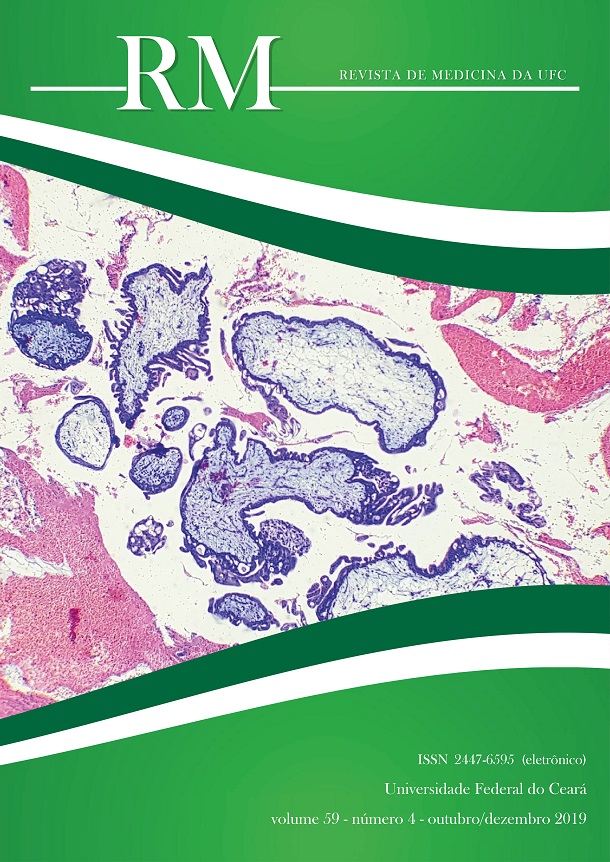Osteogenesis imperfecta and cerebrospinal fluid leak: a unique presentation and treatment challenge
DOI:
https://doi.org/10.20513/2447-6595.2019v59n4p74-78Palavras-chave:
Osteogenesis Imperfecta, Cerebrospinal fluid, Hydrocephalus, Bone diseasesResumo
Introduction: Osteogenesis imperfecta (OI) is a heritable disorder of the connective tissue that mainly manifests as bone fragility. Other signs and symptoms may be present, such as sensorineural hearing loss, cardiac malformations, and teeth alterations. Case description: 72-year-old female patient presented with left abundant spontaneous hyaline rhinorrhea, history of several bone fractures since early childhood, and a blue grayish sclera was noted. Cerebrospinal fluid (CSF) leak was diagnosed. Neuroimaging revealed lowering of the sella turcica floor, platybasia, basilar impression, left middle fossa calcified meningioma, syringobulbia, ventricular dilatation, and left ethmoidal fistula. Due to the patient’s age and clinical status, a medical approach was chosen, and treatment with acetazolamide and furosemide in low dosages, which resulted in a decrease of the rhinorrhea. Discussion: Clinical features and imaging study are often sufficient for diagnosis of OI. The neurological and cranial features in OI are varied. CSF leak is not commonly reported and might have been a consequence of bone softening and hydrocephalus. Conclusions: This case represents a treatment challenge, as the surgical results were uncertain, once bone fragility could result in the development of new leaks. Clinical treatment was chosen and resulted in a significant improvement of the symptoms.
Downloads
Publicado
Edição
Seção
Licença
Indicação de avaliadores (revisores): caso desejado, os autores podem sugerir de 1 a 3 especialistas para a revisão do manuscrito. O(s) revisor(es) deve(m) preencher os seguintes requisitos:
- ter nível de Especialização, Mestrado ou Doutorado no tema do manuscrito;
- não possuir conflito de interesses com os autores;
- não possuir vínculo com o trabalho submetido;
- o revisor sugerido pode ser um membro do corpo editorial ou não (revisor ad hoc);
Declaração
Transferência de Direitos Autorais
O(s) autor(es) vem por meio desta declarar que o artigo intitulado “TÍTULO DO ARTIGO” enviado para apreciação da comissão
editorial da Revista de Medicina da UFC é um trabalho original, que não foi publicado ou está sendo considerado para publicação em outra revista, que seja no formato impresso ou no eletrônico.
O(s) autor(es) do manuscrito, acima citado, também declaram que:
-
Participaram suficientemente do trabalho para tornar pública sua responsabilidade pelo conteúdo.
-
O uso de qualquer marca registrada ou direito autoral dentro do manuscrito foi creditado a seu proprietário ou a permissão para usar o nome foi concedida, caso seja necessário.
-
A submissão do original enviada para a Revista de Medicina da UFC implica na transferência dos direitos de publicação impressa e digital.
A declaração original deve ser assinada, datada e encaminhada por e-mail: (revistademedicina@ufc.br).
Nota: Todas as pessoas relacionadas como autores devem assinar esta declaração. Não serão aceitas declarações assinadas por terceiros.


